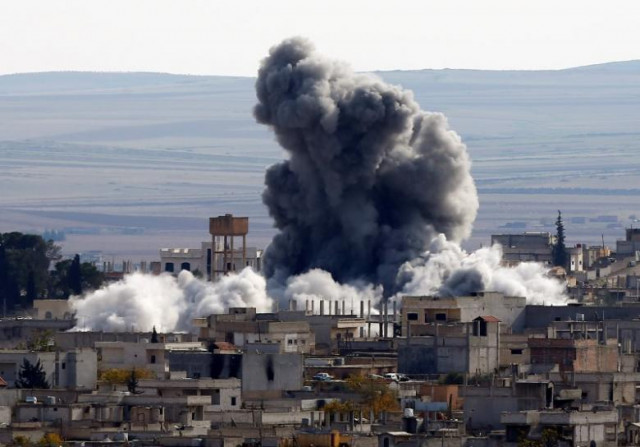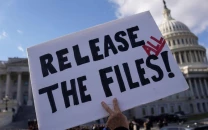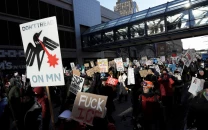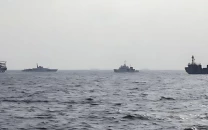Syria grows increasingly volatile for US forces
The airstrike marked the first direct US attack on the Damascus regime

American missiles on Friday struck a Syrian airbase suspected of the chemical attack earlier this week. PHOTO: REUTERS
An immediate sign of potential fallout from the strike came from Moscow, which said it would strengthen Syrian air defenses to protect the country's key infrastructure.
Russian TV says US missile strikes on Syria destroyed nine planes
Russia already has batteries of sophisticated S-300 and S-400 surface-to-air missiles in place.
These were not deployed in the US strike, but if used, such air defenses would radically alter Syria's aerial battlespace, where US planes have largely flown with little fear of getting shot down.
The United States has since late 2014 led a coalition against IS in Iraq and Syria, and flies dozens of sorties daily to bomb jihadist targets.
The vast military operation is notionally separate from Syria's brutal six-year war that has left more than 320,000 dead.
Syria's conflict began in March 2011 with anti-government protests, but has since spiraled into a bitter and complex civil war that has drawn in international players and jihadist fighters.
About 900 US ground troops, the bulk of them special operations forces, are in northern Syria, where they train and advise an Arab-Kurdish alliance fighting IS.
Further raising the stakes, Moscow also said it would cease talking to the United States on a military hotline the two powers use to keep each other apprised of where they are flying.
The channel was established in late 2015 after Russia entered Syria's conflict to prop up President Bashar al-Assad.
Moscow's move to abandon the hotline could dramatically raise the risk to pilots and ground forces on all sides, with near misses and misunderstandings far more likely in Syria's crowded skies.
The Pentagon has urged Russia to recommit to the line, and US officials say they will continue to try to use it.
"It is to the benefit of all parties operating in the air over Syria to avoid accidents and miscalculation, and we hope the Russian Ministry of Defense comes to this conclusion as well," said Major Adrian Rankine-Galloway, a Pentagon spokesman.
Iran's Rouhani says Trump abetting Syria 'terrorists'
Technically, the United States is the interloper in sovereign Syria, whereas the Russians are the invited guests. But for the most part, the Russia-backed Syria regime has left the US coalition to conduct operations as the two sides focus on different foes in the tangled conflict.
The US-led coalition fighting IS has gone to great lengths to distance itself from the Syrian civil war and left the Russians to their own devices as they pounded rebel areas including east Aleppo.
Experts say that posture is unlikely to change for now, absent a broader and better articulated Syria policy. In the space of just one week, the Trump administration has gone from floating tolerance to Assad staying in power to striking the airbase.
"The strikes are a reaction, but not a change of US strategy in Syria, to the extent that one exists," said Sarhang Hamasaeed, director of Middle East programs at the US Institute of Peace.
"The strategic focus has been on ISIS, and it will likely remain to be the same, unless blowback from the airstrikes draw in the US further, or Assad repeats other actions that will trigger more US intervention."
The limited nature of Friday's strike means retaliatory action against US forces is unlikely, experts say.
The missile bombardment of the airfield targeted only hangars, planes and logistics structures, not the runways, and contrary to demands of hawkish US lawmakers was not intended to ground Assad's air force.
"We have no indication at this point that there's been any escalatory or any attacks or any intelligence on retribution attacks on US forces," a senior military official said.
UN chief says suspected chemical attack shows 'war crimes' in Syria
Christine Wormuth, a former Pentagon official under Obama who is now a senior advisor at the Center for Strategic and International Studies, said she did not currently see a risk of the Russians or the Syrians shooting at US planes.
"Of course, there is some risk that the Syrian military could choose to attack our forces on the ground, but I think that will be extremely unwise and risky for them to do," she added.

1721969212-0/BeFunky-collage]-(35)1721969212-0-208x130.webp)

















COMMENTS
Comments are moderated and generally will be posted if they are on-topic and not abusive.
For more information, please see our Comments FAQ